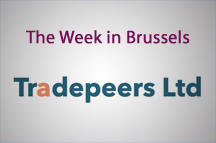 The week saw two meetings on EU citizenship rights, and a CJEU ruling. The status of EU nationals in the UK and UK nationals in the EU will be the first item on the negotiating agenda next month. Deciding the fate of 4.2 million people will set the tone for the rest of the talks and form the prelude to a new EU-UK partnership.
The week saw two meetings on EU citizenship rights, and a CJEU ruling. The status of EU nationals in the UK and UK nationals in the EU will be the first item on the negotiating agenda next month. Deciding the fate of 4.2 million people will set the tone for the rest of the talks and form the prelude to a new EU-UK partnership.
Not only am I one of these EU nationals in the UK, but I also run a business, and so the changes are doubly important for me.
Negotiating citizens' rights on either side of the Channel will be fiendishly complicated, with the risk of many categories of people being ambiguously covered by an agreement. However, the complexity could also mean a small advantage for some. For example, EU sole traders in the UK might have the best of both worlds (relatively speaking).
Suppose that negotiations go to plan and I keep the same rights as before Brexit. This means freedom of establishment, including activities as a self-employed person (art. 49 TFEU). In that case I will be better off than British sole traders in Britain with regard to trading with the EU, and also EU companies accessing the UK market.
This is because the rights that would be retained allow me to continue to develop commercial activities in the UK, something that may no longer be available under the same terms for EU companies outside the UK. Also, my Dutch nationality includes EU citizenship allowing free movement within the EU, something that British traders will lose.
 In this scenario, I can continue to provide my services freely in the UK and Europe because my rights, including self-employment, would be guaranteed under the forthcoming Withdrawal Agreement.
In this scenario, I can continue to provide my services freely in the UK and Europe because my rights, including self-employment, would be guaranteed under the forthcoming Withdrawal Agreement.
I am a European citizen who runs a British limited company and selling services to the EU may mean discrimination when the UK is outside the European single market. On the other hand, I am within my rights to conduct additional business as a sole trader, and here the legal status of my business coincides with myself as a person and therefore my business activities will have freedom of movement throughout the EU equal to my own.
This means there could be a competitive difference between an EU sole trader in the UK versus an EU trader in the EU and also a British trader in Britain. One of the EU red lines is that the UK cannot have a better deal outside the EU than inside it, therefore the latter two categories will only have access to the UK and EU markets respectively, given the terms that will be negotiated under the new EU-UK partnership.
As a businesswoman, legal uncertainty is always unwelcome, but it is worth noting that there are differences to the extent to which the 4.2 million citizens are victims and that a new legal reality could mean small, unexpected benefits. However, this does not improve the taste of the cake.












